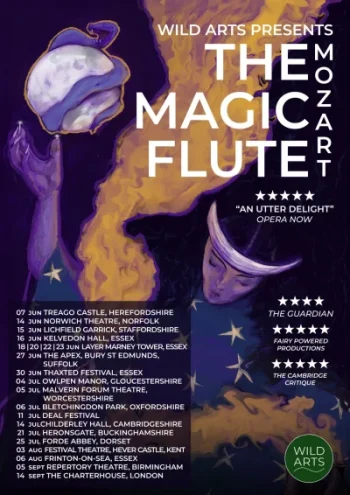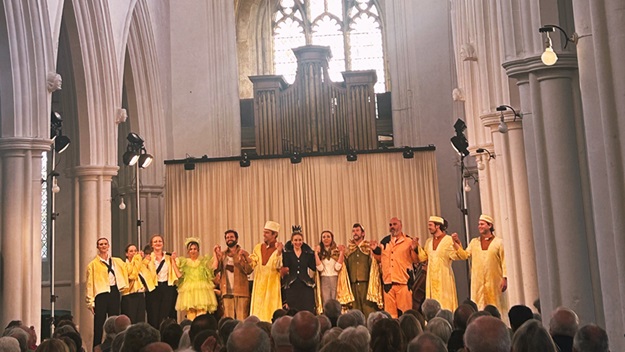 United Kingdom Thaxted Festival 2024 [2] – Mozart Die Zauberflöte (sung in English, translated by Jeremy Sams, abridged): Soloists, Orchestra / Orlando Jopling (conductor). Thaxted Parish Church, 30.6.2024. (CC)
United Kingdom Thaxted Festival 2024 [2] – Mozart Die Zauberflöte (sung in English, translated by Jeremy Sams, abridged): Soloists, Orchestra / Orlando Jopling (conductor). Thaxted Parish Church, 30.6.2024. (CC)

Production:
Director – James Hurley
Designer – Sophie Lincoln
Cast:
Pamina – Natasha Page
Tamino – Richard Dowling
The Queen of the Night – Luci Briginshaw
Papageno – Gareth Brynmor John
Papagena – Eleanor Sanderson-Nash
Sarastro – Trevor Eliot Bowes
Monostatos – Ben Thapa
First Lady – Eleanor Oldfield
Second Lady – Martha Joes
Third Lady – Abbie Ward
Speaker – Henry Wright
Priest – Lachlan Craig
The splendid production of Donizetti’s L’elisir d’amore (sung as ‘The Elixir of Love’) by Wild Arts at Thaxted Parish Church last year as part of the Thaxted Fesival was what drew me back this year for The Magic Flute.
A larger ensemble this year was onstage (it was a smaller group for the Donizetti, there with superbly crafted use of an accordion). The two productions shared a propensity for high imagination, using limited space and props to maximal effect. There are cuts and tweaks in this Flute, but despite this the whole flowed, and Wild Arts is hardly the first to re-order Mozart (Beecham famously did for his HMV recording of Die Entführung aus dem Serail, for example). So it is that the Three Ladies take on some of the Boys’ music, and the start of the second act is redistributed so the Queen of the Night’s second aria precedes the Quintet (which allows for a suggestion of a connection between the Ladies and Pamina)
Interestingly, there are parallels here between James Hurley’s inventive staging (and Wild Arts’ work in general) and that of Stephen Langridge’s Gothenburg Ring: Both are ecologically aware. Wild Arts describes the set for Flute simply as ‘a blue mat, eight stools, and a handful of LED strips’; the characters are costumed with recycled and reused materials. But the clue is in the opera’s title, Zauberflöte: Wild Arts makes magic happen. It is not only Mozart’s flute which enchants, but the combination of youthful talent, a superb group of talented professional instrumentalists, a fine conductor and an imaginative director in James Hurley, ably supported via Sophie Lincoln’s colourful designs.
The Thaxted/Gothenburg parallels do not end with the environmental aspect though. At the opening of the Mozart, during the Overture, we see the Queen of the Night rending the Sun Disc in two; a similar fatal shattering occurs in the Ring, leaving fractured outlines – human, there – across the stage. It is immediately clear Mozart’s world is that of juxtapositions and oppositions, of light and dark, of organised belief against more human emotion. It is in Mozart the journey to the Light that is paramount, and each production faces the dilemma of how to skew the emphasis between the fairy tale (and even the comedic) and the deep spirituality of Freemasonry. If the Masonic element was necessarily subdued here (the trials would have been, well, a trial to stage in a parish church), this production remains true to the core values of Wild Arts: phenomenally inventive, relentlessly entertaining, and full of insight.
The whole was, as with the Donizetti Elisir, beautifully conducted by Orlando Joplin (who also played the keyboard ‘bells’). The inventiveness of the orchestral reduction was the source of many a delight. First violin Sijie Chen, co-leader of the London Mozart Players, obviously had an inordinate amount to do and delivered with style and true tuning. The actual instrumentation used was strings (2:1;1;1), oboe, clarinet, basset horn, horn and bassoon. As far as the Overture was concerned, this redistribution had the most remarkable effect: this sounded like the perfect weekend afternoon Harmoniemusik!
There was much to admire in the strong cast. Soprano Natasha Page has a lovely, pure voice and was fully capable of projecting Pamina’s searing pain in the second act; her statement of ‘Tamino mine’ was truly touching. If Richard Dowling as Tamino seemed initially to over-project in the church’s acoustic, he dd settle to deliver a most appealing, strong-voiced account.
Cast in amongst princes and princesses plus a Queen of the Night and her dark entourage, the touchingly earthy and human figure of Papageno was superbly taken by strong baritone Gareth Brynmor John (a singer active at Welsh National Opera). The part requires huge character, and John’s clear stage presence and flair for comedy enabled him to provide the requisite balance; his Papagena was Eleanor Sanderson-Nash, brilliantly comedic too and their voices meshed beautifully. With Trevor Eliot Bowes a resonant and authoritative Sarastro (there are no fewer than three Sarastros in Wild Arts’ run), Ben Thapa a magnificent Monostatos (taking in every inch of the part’s opportunities) and superbly chosen smaller parts (the Three Ladies particularly impressive), that only leaves the infamous Queen of the Night. Luci Briginshaw has the range, she has the presence; and she presented a feisty Queen possessed of terrific ihigh notes.
Wild Arts continues to entertain and to stimulate in equal amounts. This, surely, is what fringe opera is all about. I look forward to their offering next year …
Colin Clarke
Featured Image: the cast of Wild Arts’ The Magic Flute at Thaxted Parish Church
